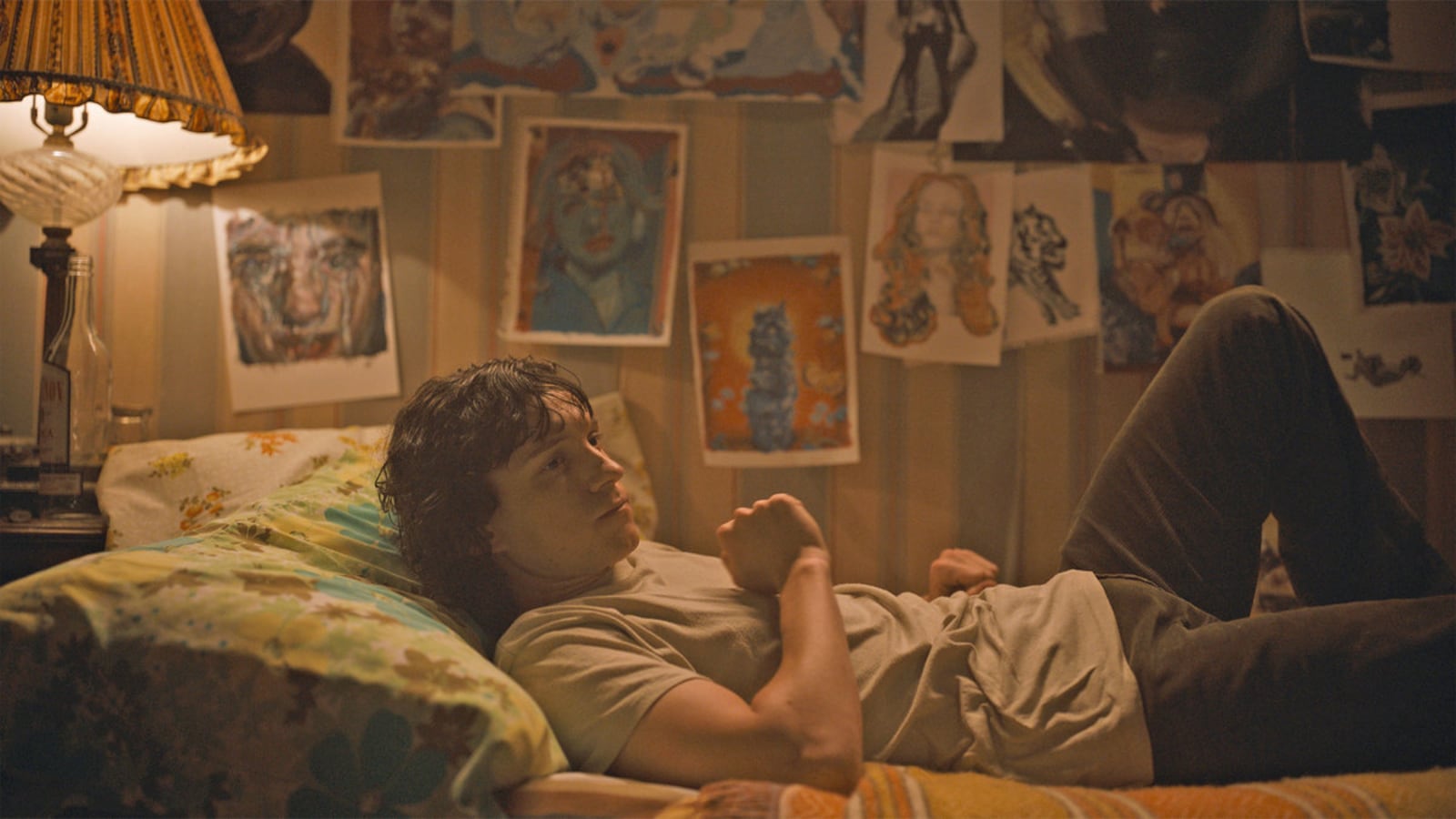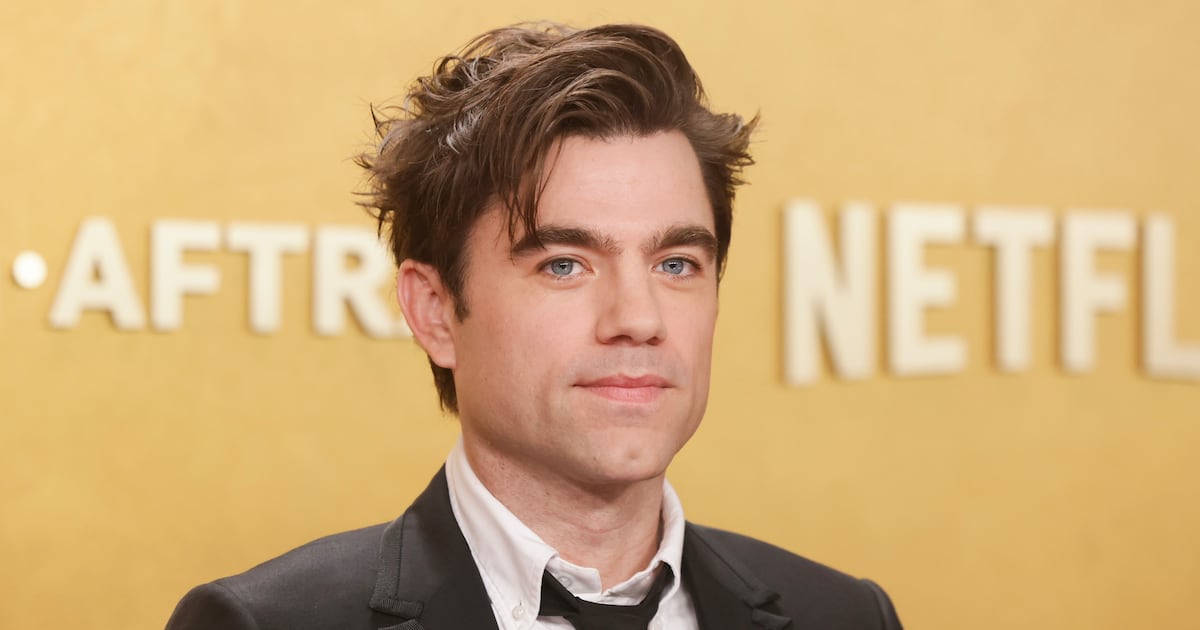Rarely has a show more ineptly masked its central mystery than The Crowded Room, a 10-part fiasco that gives away its essential secret in its credits, when it notes that it’s inspired by The Minds of Billy Milligan, a 1981 non-fiction book about an infamous serial rapist. Apple TV+ designates that bombshell, as well as any other meaningful detail about its protagonist, supporting players or plot, a spoiler, so it won’t be revealed here.
Yet considering that Billy Milligan is the subject of not only author Daniel Keyes’ aforementioned bestseller but also a 2021 Netflix docuseries (Monsters Inside: The 24 Faces of Billy Milligan), it’s impossible not to immediately know what this series is up to, thereby turning it into an excruciatingly protracted waiting game to learn things that are already plain as day.
The Crowded Room is thus a unique TV affair—one that spoils itself from the outset, and then pretends that it hasn’t, endlessly teasing the very information it’s already divulged, and continues to proffer with each ham-fisted misdirection and clunky elusion. That’s the most significant failing of Oscar-winner Akiva Goldsman’s series (which premieres June 9), although far from its only one, given that it additionally reimagines Milligan’s tale in mawkishly uplifting Hollywood terms.

Whereas Milligan was a violent predator who was acquitted due to an intensely controversial reason (and diagnosis), this saga casts its main character as an unsuccessful killer whose actions and motives are justifiable because he’s a passive victim of something I’m not allowed to mention, which saddled him with a condition that I’m forbidden from disclosing. What it peddles is melodrama that’s both clueless about its own obviousness, and designed to legitimize real-world bullshit via disingenuous fiction.
If the omissions in this review are frustrating, they pale in comparison to the holes in the memory of Danny Sullivan (Tom Holland), who’s introduced traveling by subway to Rockefeller Center with his friend Ariana (Sasha Lane), who cajoles him into executing their plan to shoot an enigmatic man dead. Danny freezes during this assault and Ariana fails to finish the job, and after fleeing back to a shadowy house, another comrade named Yitzak (Fauda’s Lior Raz) hands Danny a passport and tells him to find his father. Before he can do that, however, he’s arrested and questioned by Rya (Amanda Seyfried), who’s referred to as a professor and whose other professional title is, yes, something I’m not allowed to discuss, even though that point is also unambiguously evident.
Through the duo’s conversations, Danny’s story slowly comes into focus. Danny lives with his hard-working mom Candy (Emmy Rossum, looking too young to have birthed Holland, despite old-age make-up) and mean stepfather Marlin (Will Chase), and he spends most of his free time with best friends Mike (Sam Vartholomeos), the confident ladies-man jock, and Jonny (Levon Hawke), the bold magician.
Together, Mike and Jonny help Danny woo Annabelle (Emma Laird) and collaborate with him on a drug-dealing operation, all of which leads to altercations with bullies and crooks who are merely paper-thin devices designed to facilitate the material’s sleights of hand. During one confrontation, Danny is saved from a beating by Yitzak, and in that instant, he decides to move in with the stranger and his friend Ariana, both of whom reside in an abandoned bed-and-breakfast (across the street from his own home) that’s known as the “Ghost House.”
Most of The Crowded Room is told via Danny-POV flashbacks, and these long-winded passages eventually involve Danny’s trip to London, where he meets his dad’s former mate Jack (Jason Isaacs), Ariana’s hedonistic nightclub revelry, and much cagey talk about Danny’s dead (or is he just missing?) twin brother Adam. Because Danny is an unreliable narrator who skirts any key query that’s lobbed his way, it’s easy to determine the nature of his supposed reality.

Nonetheless, Goldsman proceeds as if he’s keeping things close to the vest, unaware that the figurative breadcrumbs he’s sprinkling throughout the early going are Mt. Everest-grade gigantic. Compounding matters further, his dialogue is uniformly leaden, as are the underlined parallels he draws between Danny and Rya—none of which, as you might have guessed, I’m allowed to explain.
It's not until its sixth and seventh installments that The Crowded Room overtly tips its hand, at which point it shifts its attention to Rya and Danny’s lawyer Stan (Christopher Abbott) and their attempts to validate Rya’s theory for why Danny is in his predicament. At every turn, the series presents its highly debatable medical concept as true, in the process warping its real-life inspiration—about a man who violated multiple women and was suspected of murdering two others upon escaping from prison—into a pitiable, and then feel-good, fable. The consequences of trauma are real, but little in The Crowded Room comes across as the least bit genuine.
Instead, the series takes the stuff of pulpy movie fantasy (and ’70s-era fad science) and treats it with prestige-TV self-seriousness. In doing so, it leaves its actors with nothing to work with but mushy, maudlin nonsense. Inhabiting a role that grows showier with each episode, Holland (as he did in his prior Apple TV+ outing, 2021’s Cherry) proves a thoroughly bland presence. Seyfried, Abbott, Lane, Isaacs, Raz and the rest of his co-stars fare no better, stuck playing one-dimensional types whose every word and action resounds as a screenwriting contrivance. Altogether, it’s an embarrassment of affection and absurdity, carried out with an air of unintentionally amusing gravity.

Every aspect of The Crowded Room is wonky, right down to its bedrock stakes; Danny barely injures anyone during his attack (a fact that allows him to be sympathetic), and yet he nonetheless faces life in prison for his crime. There’s scant internal logic to the proceedings, and while that might be generously read as a clever expression of its protagonist’s situation, it primarily seems to be a symptom of the script’s clumsiness. A daft, unoriginal and schmaltzy misfire, it seems destined to be forgotten as quickly as Danny represses his painful past—as well as confirms, through its absence, that there’s nothing more valuable than competent writing.






